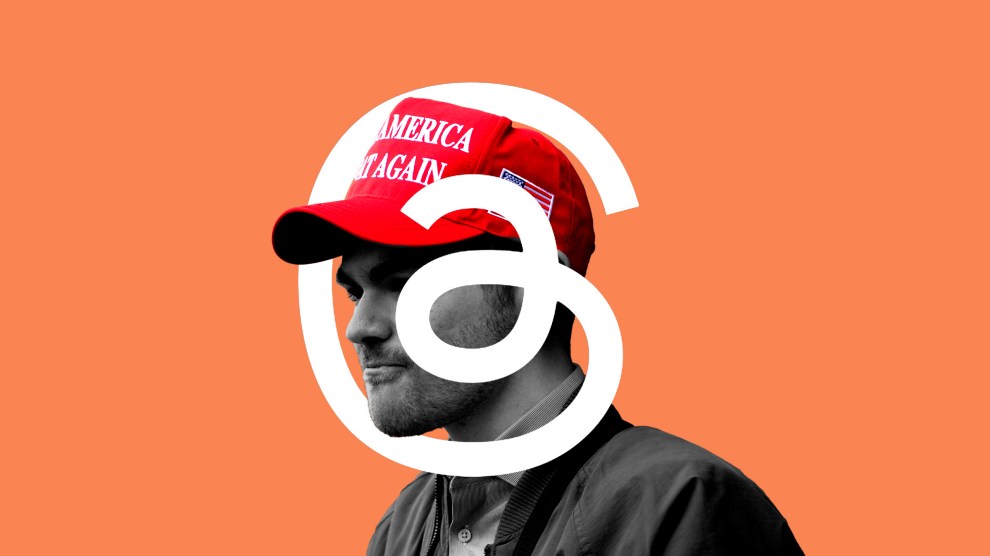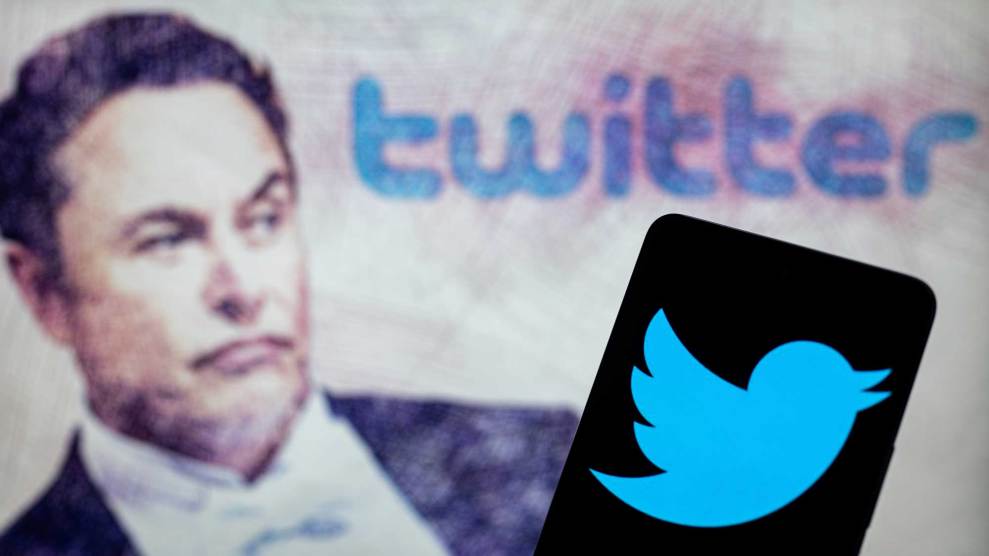
Mother Jones illustration; Nicole Hester/Ann Arbor News/AP
The rapid ascent of Threads has forced a key question facing any potentially successful social platform: “What’s the far-right going to do with this one?”
And with 100 million users joining in just five days—due, in large part, to how the Meta-owned messaging service lets users port their Instagram follows—the issue has come to the fore even earlier than usual. At this point, the answer remains murky. In essence, the far-right is not certain yet.
Their decision is an important one. To most potential users, members of the far-right are miserable people to share a platform with. If you are a woman, you will be harassed. If you are trans or gay, you will be called slurs. If you’re a minority, so will you. If you are Black, you will be called a very specific one.
When it comes to Threads, on the right, two rough—and sometimes overlapping—camps have formed: those cautiously probing its potential, and those dismissing it.
In the first camp is prominent white nationalist Nick Fuentes. “I signed up for it last night. I made a fake Instagram. I got on a fake Thread,” he claimed on a live stream documented by Media Matters shortly after the app’s release. He told his viewers to “try and build a big account. I mean, if you get in early, maybe some of you guys can blow up and red pill some people on there.”
Media Matters, the watchdog organization, had compiled a list of ultra-conservative influencers circling around Threads. Some of the most prominent to take to the platform include Libs of TikTok and far-right collaborator and hoax peddler Jack Posobiec, both of whom used their new accounts to post a succession of messages that seemed aimed at testing the boundaries of the platform’s moderation. Within a span of five minutes, Libs of TikTok posted “Non-binary isn’t real,” “Men can’t get pregnant,” “Biden likes to sniff little girls’ hair,” and “Joe Biden showered with his daughter.”
Posobiec similarly wrote that “Rachel Levine is a man,” “Migrants make neighborhoods more dangerous,” “Transwomen don’t exist,” “Trump won,” and “The 2020 election was rigged and everyone knows it.” Since then, their activity has cooled: as of Friday, Libs of TikTok and Posobiec have not posted on the platform in four days. That stands in marked contrast to their continued and frequent posting on Twitter.
Another group of far-right Twitter power users has recoiled at the idea of a competitor platform. After long being banished to fringe social media, they’ve finally found a mainstream home on Elon Musk’s Twitter—and they’re not eager to give it up.
“Mostly Peaceful Memes” is a far-right account with over 300,000 followers that regularly posts bigoted, anti-LGBTQ content. On July 6, the day Threads official debuted, it posted that the new platform was “exactly like Twitter but with way more censorship.” The tweet went viral and was liked over 22,000 times.
“End Wokeness,” another far-right account that has over 1 million followers, has a pinned tweet that is a thinly veiled racist claim about crime statistics. They posted several Tweets in the days after the Threads launch that tried to position Meta’s new platform as an inferior option to Twitter. Two of the posts garnered over 10,000 likes.
Despite their condemnations, both accounts appear to have created Thread profiles and have made several posts on the app.
The divergence reflects the bind that far-right posters find themselves stuck in. Despite all the problems associated with platforms like YouTube, TikTok, Facebook, and Instagram, their hate speech standards and moderation have limited the growth, reach, and presence of bigoted accounts.
After Musk’s acquisition, Twitter was much less likely to apply similar rules. If the locus of internet discourse moves away from Twitter to another competitor, these conservative posters will lose what they’ve built and will face diminished opportunities to post what they truly believe to the widest audience. But if the history of other platforms that have catered to the far-right is any guide, such posters will have to pick up Threads, because—aside from occasional articles by journalists who waded into platforms like the Trump-founded Truth Social or the Christian Nationalist site Gab—the broader public cares less about what’s going on in far-right echo chambers.
Of course, it’s also not yet a foregone conclusion that Threads will truly replace Twitter. As at least a few observers have pointed out, given the way Threads’ algorithmic feed boosts inane brand accounts and the platform’s general lack of original content, it has ended up being kind of boring. If it stays that way, the far-right won’t worry about needing to wade in and wage a battle against wokeness on the platform.
Beyond that, there’s another way this could all be moot. Adam Mosseri, who as Head of Instagram has a leadership role overseeing Threads, has already suggested the platform will deprioritize posting on politics and news. They aren’t, he says, “worth the scrutiny, negativity (let’s be honest), or integrity risks.”

















